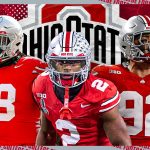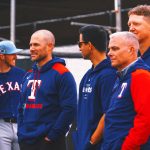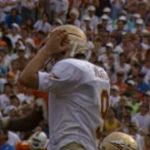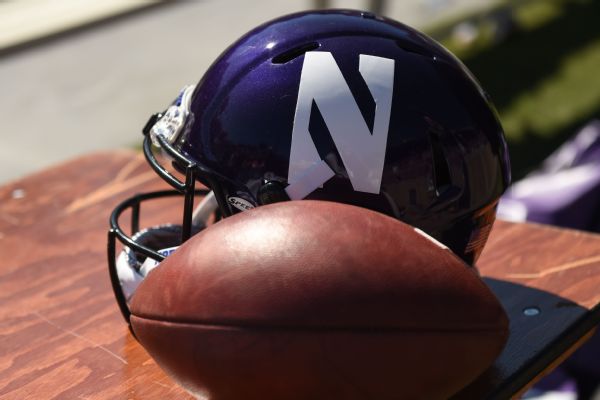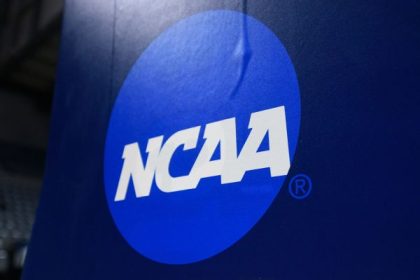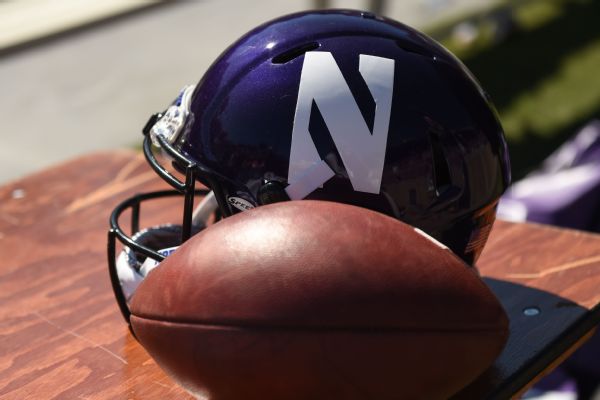
A former Northwestern football player who came forward with allegations of widespread hazing within the program spoke Sunday with university president Michael Schill, who is considering harsher discipline for coach Pat Fitzgerald.
The former player, who spoke to ESPN on the condition of anonymity, said he told Schill about the hazing he witnessed and experienced at Northwestern, much of which he said was sexualized. Schill, in a letter sent late Saturday to the Northwestern community, had said he will reassess the two-week suspension Fitzgerald received Friday following a university-commissioned investigation of the hazing allegations.
“Fitz absolutely knew about hazing in this program,” the former player told ESPN. “Fitz absolutely failed by not intervening. Fitz knew, and he should have made it stop; and if he truly did not know, he should not be the head coach. Either way, he should not be the head coach, because he is not monitoring and protecting the safety and well-being of student-athletes.”
Fitzgerald, the team’s coach since 2006 and a decorated former Northwestern player, said in a statement on Friday that he had no knowledge of hazing activities within the program. The university’s investigation, led by attorney Maggie Hickey and the ArentFox Schiff firm, found that while the former player’s allegations were “largely supported by the evidence,” coaches did not know about ongoing hazing — although they had opportunities to discover and report problematic conduct. The school did not release specific findings.
Northwestern players on Saturday released a statement supporting Fitzgerald, saying he had no knowledge of the alleged incidents and that the accusations from the former player were “exaggerated and twisted.”
The former player said Sunday that Schill was “extremely receptive” to his accounts of hazing within the program and offered him resources to deal with the trauma.
A current Northwestern player, who asked to remain anonymous, also told ESPN on Sunday that the former player, whose hazing allegations late in 2022 launched the investigation, informed him of a detailed plan with the sole objective to take down Fitzgerald. The current player on Sunday relayed a conversation he said he had early this year with the former player to Northwestern trustees and other influential university figures.
“He just kept emphasizing, ‘Yeah, it’ll be OK. I’m just trying to get Coach Fitz fired,'” the current player told ESPN. “I don’t think he ever acknowledged what he’s saying is not true. It was just like, ‘I might embellish or exaggerate to get Coach Fitz fired.’ He said his sole goal was to see Coach Fitz rot in jail.
“The truth is none of that stuff happened in our locker room.”
The current player said the former player told him he would go public with detailed allegations if the university’s investigation did not result in Fitzgerald’s dismissal and referenced the 2021 situation involving athletic director Mike Polisky, who stepped down amid media and public pressure nine days after being promoted. Polisky had been named as a defendant in a lawsuit filed by a former Northwestern cheerleader.
“He was thinking he could do the same with Coach Fitz, if he went to The Daily Northwestern and went public with it,” the current player said.
Told of the current player’s account, the former player said he wanted to “absolutely seek action to get Fitz out of the program” but that he had other objectives.
“I want to shed light on this heinous, illegal behavior,” the former player said. “I wanted illegal behavior out of the program. This is an absolutely barbaric and egregious culture that ultimately lies on the shoulders of the head coach.”
The former player told ESPN that hazing was organized and widespread in Northwestern’s program, often led by a group of older players called the “Shrek gang.” The group would lead a hazing activity called “running,” usually against freshmen or younger players who had made mistakes in practice, he said. According to the former player, older players wearing masks would restrain the victim in a dark locker room and engage in sexualized behavior. The former player said he was “run” as a freshman.
“They have been held down against their will by numerous upperclassmen with masks on and have been violently dry-humped in a dark room,” the former player said. “This is Title IX stuff, this is sexual abuse and sexual assault. I don’t know why the university isn’t making the details public.”
The former player said Fitzgerald signaled for players to be added to “Shrek’s list” with a specific clapping motion during practice. He said he saw Fitzgerald make the motion at least five times since the 2020 season.
“He would be smiling menacingly at the individual who messed up, while simultaneously clapping his hands over his head in the specific manner, i.e., our head coach communicating that this individual did something wrong and needs to be put on the list and hazed accordingly. The vast majority of the team would then join in, following Fitz’s lead,” the former player said.
The current player told ESPN that the team starts practices with slow claps but that he has never seen Fitzgerald engage in the clapping as a signal.
The former player said names would be added to a whiteboard in the locker room and that the “running” would then take place at certain times of the year, including Thanksgiving and Christmas. The former player sent ESPN a photo of a whiteboard, headlined “SHREK’S LIST” and listing the names of players, as well as bulleted items that included “naked slingshot,” “naked bear crawls,” “naked [center-quarterback] exchange” and “naked pass rush.”
“That was in the middle of the locker room for all eyes to see throughout my entire time in the program,” the former player said. “I will say with 100% certainty that every single individual who has ever come in this program between 2020 and now has seen [the whiteboard]. Every single player in this program from 2020 to 2023 knows what Shrek is and knows about the hazing that occurs.”
The current Northwestern player told ESPN that he never heard of “Shrek’s list” and had never seen the whiteboard in the locker room. He added that Fitzgerald stays out of the locker room, telling players it belongs to them.
The former player outlined other instances of hazing in which players had to perform naked acts in the locker room, including mimicking the center-quarterback exchange in football games. He cited the “car wash,” in which naked linemen soaped up their bodies and blocked the entrance to the team showers. He also described the “Gatorade shake challenge,” in which three freshmen were forced to drink as many Gatorade shakes as they could within 10 minutes.
“I never saw someone not violently throw up either during or after the challenge,” the former player said. “I have seen freshmen forced to participate get sick from this tradition for a number of days following the event.”
Another former player who played early in Fitzgerald’s tenure told ESPN that he saw the “Gatorade shake challenge” as well as the “car wash.” The second former player mentioned other incidents in which players were coerced to do naked pullups and other things in a gym during preseason camp in Wisconsin.
“Did I feel comfortable? Not really. But did I feel like I had a choice? No,” the other former player said. “Some people thought it was fun, while other people thought it wasn’t a cool experience. It was very traumatic. In that sense, it does point to a culture because there’s a fine line as it pertains, is this team bonding, team building, or is this hazing?”
The whistleblower said he spoke to other former Northwestern players who concluded their careers before he arrived at the program and that they saw the same hazing activities.
The former player also said Northwestern’s assistant coaches were negligent about the hazing. He said he witnessed several instances in which his position coach was asked about “Shrek,” only for the coach to “put his hands up in the air and say, ‘Stop talking. I don’t want to know anything about it.'”
The current player, who shared the same position room as the former player, said “Shrek” never came up in meetings.
Asked about Saturday’s statement from the team pushing back against his allegations, the former player told ESPN: “Obviously, people are going to come out and publicly support Fitz and publicly oppose hazing, but of course there would be this response because most individuals within this program are either perpetrators or bystanders.”

